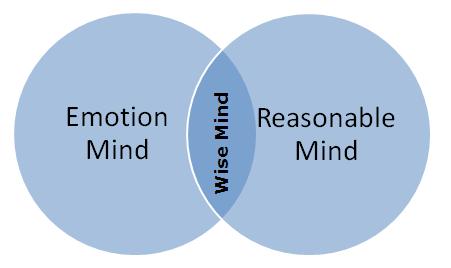Wise Mind
Wise Mind (Linehan 1993) is the balanced part of us that comprises our inner knowledge and intuition, where our emotional thinking mind (thoughts driven by distressing feelings) and rational thinking mind come together, the part of us that just "knows" that true reality.
Emotion mind drives opinion, whilst reasonable mind is fact-based (fact or opinion?) Asking ourselves what 'wise mind' might make of this situation will help us to stand back and be more aware of the bigger picture, and help us respond in more helpful and effective ways.
Within any meeting of people all the individuals will of course have their own belief system, and will therefore have different perspectives - see and think about things differently - and this will affect the way these individuals interact with each other.
We can learn to be more aware of how our own belief system affects us, and consider how others might see the same situation quite differently.
Wise Mind is the balanced part of us that comprises our knowledge and intuition, where thinking mind and emotion mind come together, the part of us that just "knows", that inner truth:
"Wise Mind" can be replaced with the most helpful term for you, e.g. clean mind (substance misuse), or "Emotion Mind" could be replaced with e.g. anorexia mind, OCD mind, depression mind, trauma mind.
DBT uses the theory of Wise Mind (Linehan 1993) - the part of our mind where 'Emotional Mind' (thoughts based on our feelings) and 'Reasonable Mind' (rational thinking part) merge together.
Emotion Mind
- Thinking and behaviour controlled by emotional state
- Thoughts are unhelpful and distressing
- Difficult to think logically and rationally
- Facts are distorted to fit with current distress
- Opinions
- Strong emotions drive strong behaviour
- What I want to do
Reasonable Mind
- Intellectual, scientific
- Logical and rational thinking
- Factual thinking, based on evidence
- Able to plan how to respond
- Focuses attention
- Cool in approaching problems
- What I should do
Wise Mind
- Integrates Emotion Mind and Reasonable Mind
- Adds intuitive knowing to emotional distress and logical analysis
The calm that follows a storm - Sees or knows something directly and clearly
- Grasps the bigger picture, rather than just parts
- Ensures needs of both Emotion Mind and Reasonable Mind are met: Reasonable Mind is right, but Emotion Mind needs to be soothed
- What's the most appropriate and effective skills that I could use for this situation?
Wise Mind Worksheet (PDF)
WISE MIND MEDITATION mp3
Female voice, with music.
WISE MIND MEDITATION mp3
Male voice, with music.
25 mins
![]()
CHIMP BRAIN (by Dr Steve Peters) describes the mind in 3 parts: Chimp Brain (Emotion Mind), Human Brain (Reasonable Mind) and Computer Brain (our Core Beliefs).
Managing Chimp Brain calls for Wise Mind (Listening to Chimp Brain and giving it what it needs) then Proceeding Wisely (Distracting the Chimp or Box it - using Thought Challenging techniques)
The Chimp Paradox: Book by Dr Steve Peters
Books
DBT Skills Training Handouts And Worksheets
The Dialectical Behavior Therapy Skills Workbook: Practical DBT Exercises for Learning Mindfulness, Interpersonal Effectiveness, Emotion Regulation ... Tolerance
DBT Made Simple: A Step-by-Step Guide to Dialectical Behavior Therapy
The Expanded Dialectical Behavior Therapy Skills Training Manual: Practical DBT for Self-Help, and Individual & Group Treatment Settings
Resources
Wise Mind Worksheet (PDF)
WISE MIND MEDITATION mp3
Female voice, with music.
WISE MIND MEDITATION mp3
Male voice, with music.
25 mins
![]()























